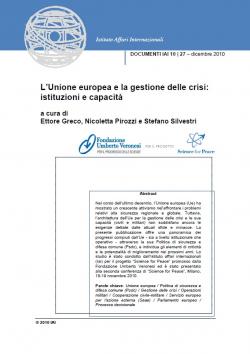L'Unione europea e la gestione delle crisi: istituzioni e capacità
Over the last decade, the European Union (EU) has shown a growing activism in dealing with both regional and global security challenges. However, the EU’s architecture for crisis management and its capabilities (civilian and military) do not yet meet the needs dictated by current challenges and threats. This publication offers an overview of the progress achieved by the EU – both at the institutional and operational levels – through its Common Security and Defence Policy, and identifies the critical elements and the potential for improvement in the coming years. This study has been conducted by the Istituto Affari Internazionali (IAI) for the project Science for Peace promoted by the Fondazione Umberto Veronesi and has been presented in the framework of Science for Peace 2nd Annual World Conference, Milan, 18-19 November 2010.
Translation by Daniela Fogliada, Giordano Merlicco and Leonardo Tiengo of: EU Crisis Management: Institutions and Capabilities in the Making, Roma, IAI, November 2010 (IAI Quaderni English series 19).
-
Details
Roma, Istituto affari internazionali, December 2010, 88 p. -
In:
-
Issue
10|27
Prefazione, di Ettore Greco
Lista degli acronimi
1. Le capacità militari dell’Ue - alcune forze, ma non ancora un esercito europeo, di Claudia Major e Christian Moelling
2. Le capacità civili dell’Ue e la cooperazione con il settore militare, di Isabelle Ioannides
3. Il Servizio Europeo per l’Azione Esterna e la Politica di Sicurezza e Difesa Comune (Psdc), di Gerrard Quille
4. Il controllo democratico della Psdc e il ruolo del Parlamento Europeo, di Michele Comelli
Conclusioni e raccomandazioni politiche. Quale modello di gestione delle crisi per l’Ue? Realtà e prospettive nell’era post-Lisbona, di Ettore Greco, Nicoletta Pirozzi e Stefano Silvestri
Topic
Tag
Related content
-
Publication06/01/2015
EU Crisis Management
leggi tutto -
Ricerca02/11/2014
EU crisis management: institutions and capabilities in the making
leggi tutto



